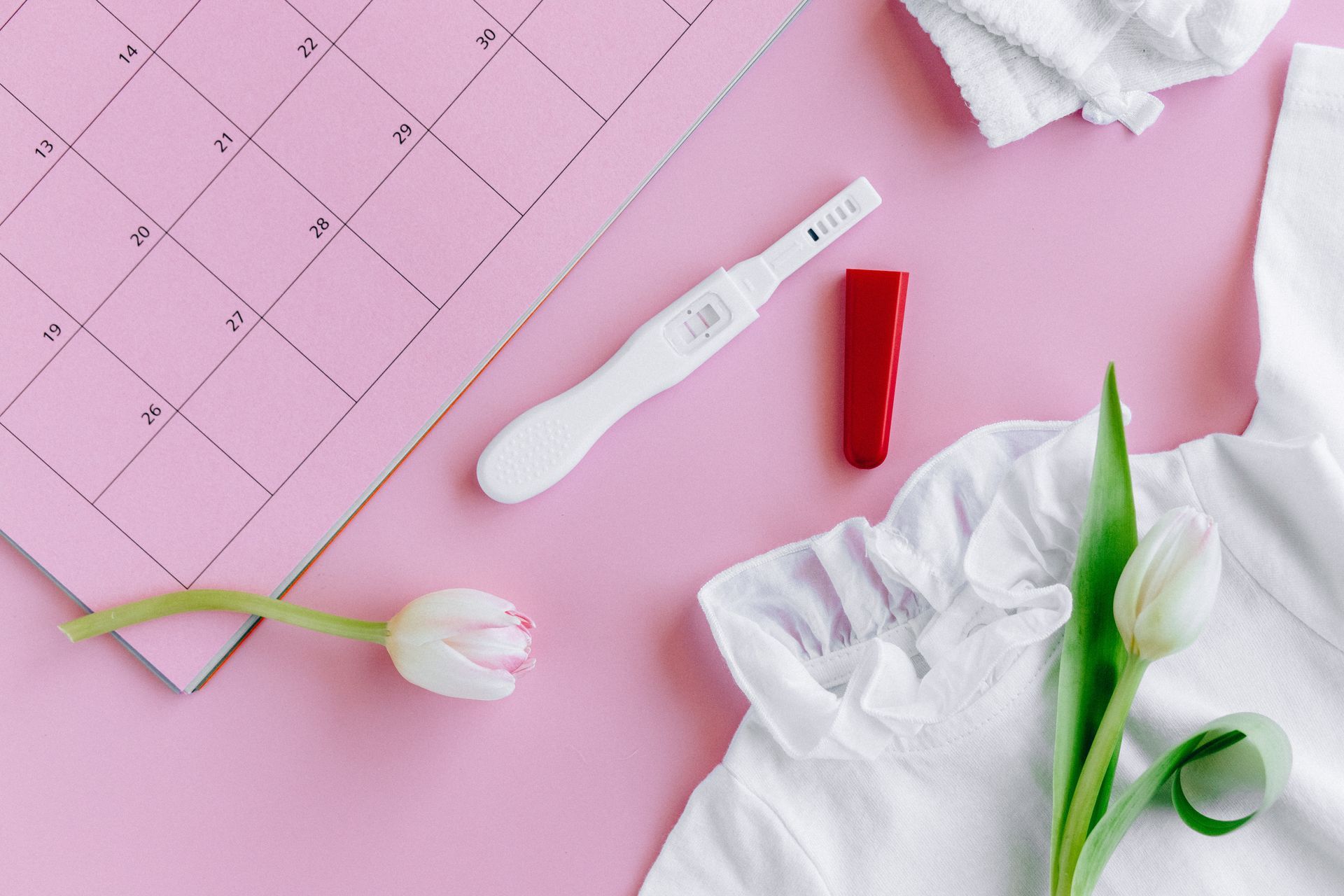Top Supplements for Optimal Fertility & Pregnancy
Top Supplements for Optimal Fertility & Pregnancy

Do you ever wonder if we’ve been educated enough about the nutrients needed to support optimal fertility during the preconception period?
I know I wasn’t.
Usually, when we decide to start trying for a baby, we reach for the standard prenatal supplement (hint: it starts with an E) recommended by our doctors and pharmacists. The truth, however, is that most common prenatal supplements contain poorly absorbed versions of essential nutrients, which might not be the best choice for nurturing new life. Plus, when we encounter challenges with conception, not many people are talking about the specific nutrients needed to support optimal fertility.
So let’s dive into what nutrients we actually need for optimal fertility and preconception…
Folate (Vitamin B9)
Folate is a crucial nutrient for the fertility of both men and women alongside its role during pregnancy.
In women, folate can assist ovulation by helping regulate the menstrual cycle, it helps prevent neural tube defects during early stages of pregnancy and also helps with hormone regulation by increasing progesterone levels.
In men, folate may support the production of healthy, properly-formed sperm, improving sperm count, motility and morphology.
Folate plays a major role in the creation of DNA and RNA, the building blocks of life. But here’s the catch: the form of folate matters. Foods offer folate in the right form, but folic acid (the synthetic form) might not cut it. Plus, for those with the MTHFR gene, the 5-MTHF form of folate is a better match.
This prenatal contains the 5-MTHF form of folate which is easily converted for nearly everyone.
B Vitamins
B vitamins play a crucial role in supporting fertility and a healthy pregnancy because they are involved in various biological processes that are essential for reproductive health and the development of a healthy baby. Here are some ways B vitamins support fertility and pregnancy:
- Vitamin B6 - Involved in hormone regulation and proper functioning of the ovaries and can help alleviate some pregnancy-related symptoms such as morning sickness and mood swings. It also supports the development of baby’s brain and nervous system.
- Vitamin B12 - Important for DNA synthesis, neurological (brain) function and the formation of red blood cells. It is crucial for the baby’s nervous system and can assist in the uptake of folate.
- Vitamin B1 (Thiamine) - Deficiencies are linked to failed ovulation and implantation. Thiamine is involved in energy metabolism and nerve function. It can help combat fatigue and improve overall health.
- Vitamin B2 (Riobflavin) - Deficiencies are linked to sterility miscarriage and low birth weight. Riboflavin is important for the development of baby’s eyes, skin, and nerve cells. It also helps the body metabolise carbohydrates, fats and proteins, ensuring proper nutrient absorption.
- Vitamin B3 (Niacin) - Helps maintain healthy skin, nerves and digestive functions in the foetus during pregnancy.
- Vitamin B5 (Pantothenic Acid) - It’s important for the foetal development at the time of conception and supports the production of essential lipids for the development of the baby’s skin and other organs. It is also involved in hormone production and synthesis of fatty acids and cholesterol in the pregnant or female trying to conceive.
Iron
Low iron levels have been shown to reduce the chances of ovulation occurring as the body will prioritise keeping you alive over reproduction. The thyroid is impacted by low iron levels and if thyroid hormones are reduced this can impact ovulation. Adequate iron levels also ensure there is adequate lining of the endometrial tissue which assists implantation.
During pregnancy, it’s important to ensure iron levels are adequate to prevent iron deficiency anemia, assist in growth and division of cells which is essential in early pregnancy for rapid growth of the placenta and development of the fetus. Not only that, the immune system is naturally suppressed during pregnancy to prevent rejection of the foetus and iron plays a key role in supporting immune function to prevent infection for both mum and baby. Lastly, adequate iron levels during pregnancy reduce the risk of preterm birth and can help prevent pre-eclampsia. Beef liver has the highest amount of bioavailable iron in food which you can grab in
this blend
for mum’s and mums-to-be.
Vitamin D
Vitamin D receptors are present in the reproductive tissues of both men and women. It plays a role in regulating sex hormones, including oestrogen and testosterone, which are crucial for reproductive health and fertility. Adequate vitamin D levels may support regular ovulation, while deficiencies can disrupt the menstrual cycle and potentially affect fertility. In men, deficiencies have been linked to impaired sperm count and motility but adequate levels show greater sperm motility.
During pregnancy, vitamin D can support immune health, reducing the risk of infections. Vitamin D is essential for the absorption and utilisation of calcium, which is crucial for the development of the foetal skeleton. It helps prevent conditions like rickets and ensures proper bone formation in the baby. Adequate levels have also been associated with reduced risk of complications such as pre-eclamspia, gestational diabetes and preterm birth. Getting sunshine is really important but supplementation can be obtained from
cod liver oil
or
here.
Coenzyme Q10 (CoQ10)
CoQ10 is your mitochondria’s best friend. It powers up the cells, especially egg cells, helping provide the energy needed for fertilisation and early embryo development. For women, CoQ10 supports healthy ovulation and top-notch eggs. Men benefit too, with enhanced sperm motility and DNA protection from oxidative stress.
During pregnancy, oxidative stress levels are elevated and the foetus is more vulnerable. CoQ10 functions as an antioxidant giving it the ability to neutralise free radicals in the body. Supplementation with CoQ10 may help reduce the risk of complications such as pre-eclampsia, gestational hypertension and preterm birth. It may contribute to the quality and viability of embryos, increasing chances of successful implantation and a healthy pregnancy. As we age, our CoQ10 levels are naturally decreasing and so supplementation may be beneficial in women of advanced maternal age. Sourcing of this is incredibly important and so for that reason the brand I recommend is
this.
Zinc
Zinc is a key component of seminal fluid and is crucial for normal sperm production and motility by helping to maintain the structural integrity of the sperm cell. In women, zinc contributes to healthy egg development and maturation, which is necessary for successful fertilisation. Zinc supports the process of fertilisation by promoting a favourable environment within the female reproductive tract. Zinc is also involved in regulating the production and function of various hormones, including those related to the reproductive system. This can impact ovulation and menstrual health in women.
During pregnancy, zinc is essential for early embryo development, helping to ensure that the fertilised egg forms a healthy embryo and implants properly in the uterine lining. Zinc also plays a role in cell growth and division which we know is important for the development of the placenta and foetus. As mentioned before, the immune system is naturally suppressed during pregnancy and zinc is crucial for a well-functioning immune system. If you can get zinc from oysters, highly recommend! Or you can grab
these.
Omega-3’s
Omega-3’s help regulate hormones, promoting healthier menstrual cycles in women and better sperm quality in men. These fatty acids can help regulate the release of eggs during ovulation and improve the quality of cervical mucous, making it easier for sperm to travel and fertilise an egg.
In pregnancy, omega-3’s, DHA in particular, is a critical component of brain development in the foetus. It contributes to the baby’s nervous system, eyes and brain and supports the development of the baby’s heart and circulatory system. Omega-3’s help manage inflammation in the mother’s body, reducing the risk of pregnancy complications along with reducing the risk of preterm birth and low birth weight. They also help maintain healthy blood pressure levels during pregnancy. Grab yours
here.
Iodine
Iodine plays a critical role in fertility and pregnancy due to its impact on thyroid function and the developing baby’s overall health. It’s an essential component of the thyroid hormones, thyroxine (T4) and triiodothyronine (T3). These hormones regulate metabolism and, in turn, play a vital role in maintaining hormonal balance, including the sex hormones necessary for fertility.
During pregnancy, iodine can help ensure proper functioning of the thyroid gland which is essential for baby’s brain development, nervous system and overall growth. Iodine is particularly important during the first trimester when the baby’s brain and nervous system are rapidly developing. Adequate iodine levels support a healthy pregnancy and can reduce the risk of complications such as goiter (enlarged thyroid), stillbirth and cretinism. Iodine intake should be monitored for individuals with thyroid conditions and you can find it
here.
Myo-Inositol
Myo-inositol is a naturally occurring substance that plays a role in fertility and pregnancy, particularly in women with polycystic ovarian syndrome (PCOS). It is believed to improve ovarian function and regulate menstrual cycles, which can be irregular in women with PCOS. By supporting more regular ovulation, it can enhance fertility. Myo-inositol is thought to enhance insulin sensitivity which is common in women with PCOS and can lead to hormonal imbalances. Myo-inositol may help stabilise insulin levels, reducing the excess production of androgens (male hormones) that can hinder ovulation.
During pregnancy, myo-inositol may help maintain healthy blood glucose levels, reducing the risk of gestational diabetes. Adequate levels during pregnancy are also important for reducing the risk of neural tube defects in the developing baby. For women with PCOS, continuing myo-inositol supplementation during pregnancy may help maintain ovulatory function, which can contribute to successful conception and a healthier pregnancy. You can grab it
here.
Choline
Choline is involved in the production of a neurotransmitter called acetylcholine, which plays a role in ovarian follicle development and maturation. Adequate levels support healthy ovulation. It is also a precursor to phosphatidylcholine, a component of cell membranes. Proper cell membrane function is essential for hormone receptor sensitivity and signalling (i.e. hormone regulation), which affects fertility.
During pregnancy, choline is crucial for the development of the foetal brain and nervous system. It aids in neural tube closure, which is essential for preventing birth defects like spina bifida. Choline is important for the cognitive development of the growing foetus. It supports memory and learning functions in the baby’s brain. Choline may help reduce the risk of gestational diabetes by supporting healthy glucose metabolism. Adequate choline levels also support the formation and function of the placenta, which is essential for nutrient and oxygen exchange between the mother and foetus.
Whilst I have sprinkled recommendations of where to get each vitamin throughout this blog, I have two preferred pre-natal vitamins that I recommend.
The first is the
Naturobest.
Naturobest was formulated by a fertility expert naturopath who wanted to provide high quality supplements that were trimester specific and bioavailable for majority of women. They have a trimester 1 prenatal which incorporates ginger to help reduce morning sickness and nausea and less iron as iron can increase morning sickness symptoms. In their trimester 2, 3 & breastfeeding formula it has an increased amount of iron due to the higher needs during those trimesters, however, to call it a “prenatal” they couldn’t put as much iron or choline in as they wanted due to TGA requirements. So, if you are taking this prenatal, I would recommend adding in additional iron through beef liver or a supplement and choline from eggs. You can grab the first trimester one here and second, third trimester + breastfeeding here.
The Foraged mother’s blend was formulated by a nutritionist who saw a gap in the market of nutritious prenatals that actually supported women through pregnancy and breastfeeding. This blend includes fermented veggies and beef liver to support probiotic health in the gut and ensure you are getting enough nutrients to support a growing life. You can grab this one here.
As you can see, the term “you are what you eat” really rings true when our body is creating new life. Conceiving a baby truly is a miraculous event and every nutrient plays a key role in ensuring that foetus develops into a healthy, thriving baby. I hope this has been helpful for you and I’d love you to share any feedback over in my Instagram DM’s @_wildlywell
Please note that this is not medical advice, speak to your healthcare practitioner and follow their medical advice for your personal situation.
References
- Abosamak NER, Gupta V. (2017). Vitamin B6 (Pyridoxine). StatPearls Publishing. https://www.ncbi.nlm.nih.gov/books/NBK557436/
- Abu-Ouf, N. M., & Jan, M. M. (2015). The impact of maternal iron deficiency and iron deficiency anemia on child's health. Saudi medical journal, 36(2), 146–149. https://doi.org/10.15537/smj.2015.2.10289
- Adams, J. B., Kirby, J. K., Sorensen, J. C., Pollard, E. L., & Audhya, T. (2022). Evidence based recommendations for an optimal prenatal supplement for women in the US: vitamins and related nutrients. Maternal health, neonatology and perinatology, 8(1), 4. https://doi.org/10.1186/s40748-022-00139-9
- Agbalalah, T., Robert, F. O., & Amabebe, E. (2023). Impact of vitamin B12 on the reproductive health of women with sickle cell disease: a narrative review. Reproduction & fertility, 4(3), e230015. Advance online publication. https://doi.org/10.1530/RAF-23-0015
- Chavarro, J. E., Rich-Edwards, J. W., Rosner, B. A., & Willett, W. C. (2008). Use of multivitamins, intake of B vitamins, and risk of ovulatory infertility. Fertility and sterility, 89(3), 668–676. https://doi.org/10.1016/j.fertnstert.2007.03.089
- Chavarro, J. E., Rich-Edwards, J. W., Rosner, B. A., & Willett, W. C. (2006). Iron intake and risk of ovulatory infertility. Obstetrics and gynecology, 108(5), 1145–1152. https://doi.org/10.1097/01.AOG.0000238333.37423.ab
- Elite IVF. (n.d.). Coenzyme Q10 & Fertility. https://www.elite-ivf.com/coenzyme-q10-and-fertility/
- Fallah, A., Mohammad-Hasani, A., & Colagar, A. H. (2018). Zinc is an Essential Element for Male Fertility: A Review of Zn Roles in Men's Health, Germination, Sperm Quality, and Fertilization. Journal of reproduction & infertility, 19(2), 69–81.
- Garner, T. B., Hester, J. M., Carothers, A., & Diaz, F. J. (2021). Role of zinc in female reproduction. Biology of reproduction, 104(5), 976–994. https://doi.org/10.1093/biolre/ioab023
- Gaskins, A. J., Afeiche, M. C., Wright, D. L., Toth, T. L., Williams, P. L., Gillman, M. W., Hauser, R., & Chavarro, J. E. (2014). Dietary folate and reproductive success among women undergoing assisted reproduction. Obstetrics and gynecology, 124(4), 801–809. https://doi.org/10.1097/AOG.0000000000000477
- Gaskins, A. J., Mumford, S. L., Chavarro, J. E., Zhang, C., Pollack, A. Z., Wactawski-Wende, J., Perkins, N. J., & Schisterman, E. F. (2012). The impact of dietary folate intake on reproductive function in premenopausal women: a prospective cohort study. PloS one, 7(9), e46276. https://doi.org/10.1371/journal.pone.0046276
- Hoek, J., Steegers-Theunissen, R. P. M., Willemsen, S. P., & Schoenmakers, S. (2020). Paternal folate status and sperm quality, pregnancy outcomes, and epigenetics: a systematic review and meta-analysis. https://doi.org/10.1002/mnfr.201900696
- IVF Australia. (n.d.). Why is iodine important to preconception and pregnancy health? https://www.ivf.com.au/blog/why-is-iodine-important-to-preconception-and-pregnancy-health#:~:text=One%20common%20recommendation%20for%20a,healthy%20fertility%2C%20conception%20and%20pregnancy.&text=So%2C%20why%20Iodine%3F,hormones%20which%20controls%20our%20metabolism.
- Kareem, O., Nisar, S., Tanvir, M., Muzaffer, U., & Bader, G. N. (2023). Thiamine deficiency in pregnancy and lactation: implications and present perspectives. Frontiers in nutrition, 10, 1080611. https://doi.org/10.3389/fnut.2023.1080611











